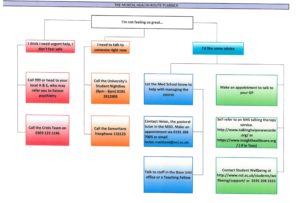The big takeaway
- Effective signposting to relevant local mental health services – along with prompts asking them how they are feeling – can stop students slipping through gaps of poorly joined-up support services.
- This resource was created by fourth year students who had the vision and motivation, and required only one meeting with pastoral care staff at the University to check accuracy.
Who was involved?
- Two medical students at Newcastle Medical School
- Pastoral care support staff member at Newcastle Medical School
Newcastle Medical School has around 250 students in each year group, which has recently increased due to the allocation of new medical student places and the closure of the campus at Durham University. The size and complexity of the student population poses a unique challenge in supporting student mental health needs, as often different organisations and branches of the university would take different approaches to a student’s care.
Mental health toolkit
The Mental Health Toolkit was aimed at all Newcastle Medical School students, amalgamating current provisions across the university and the region into one easy-to-access flowchart [screenshot shown below, you can download the PDF at the bottom of this case study]. According to their needs, students were directed either to the medical school, university or local NHS services. It was written by Ellisiv Clarke and Charlotte Whitton, then fourth-year students, when they realised those struggling around them were slipping through the net of poorly conjoined student support services.

Assessing urgency and appropriateness
We collated a list of all the services available in the area, and assessed the urgency and appropriateness of each in the context of student needs. We then formed a flow chart asking students how they felt, what type of support they were seeking and how and when they would wish to access it. We met with the medical school only once, with Helen Maitland of the pastoral care team agreeing to check the information once it was collated. Helen Hargreaves, of NTW Foundation Trust, was instrumental in her support and in bringing the idea to fruition in our initial meeting.
Sharing the chart with students
Our main challenge was distribution; how could we ensure students would see the flowchart? We overcame this by suggesting teachers and base unit leaders on clinical placement should be aware of the flowchart, and therefore able to distribute handouts and appropriately assist those who come to them for help.
The Mental Health Toolkit was distributed at the beginning of the next academic year. Feedback suggested it was effective for student based in the medical school; however we are now looking to adapt the Toolkit for students on placements across the North-East, as contacting central educators at the medical school can be challenging if the student is based in Carlisle or Middlesbrough.
Overall, the toolkit has been hailed as a clear and easy-to-use resource, guiding students to the appropriate services with ease. It would be useful to follow up with the students as to their opinions on the support they then received, and perhaps adapt the toolkit appropriately.
Download the Mental Health Toolkit (one page, PDF)
Download the Mental Health Route Planner (one page, PDF)

